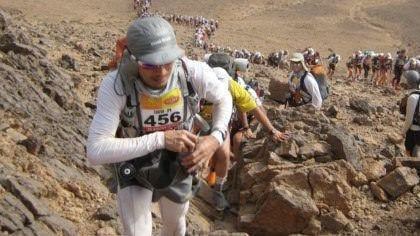

Words: Gentleman's Journal
Races traversing the Amazonian jungle, Antarctica, the Sahara, Gobi and Atacama deserts have more in common than just their gruelling physical trials. As it transpires they each draw around 30% of their demographics from the financial sector, evidence of a growing tendency amongst the business elite to take on ultra-marathons.
It is unsurprising to see high-net worth competitors participating, given a race such as the Marathon des Sable would set you back £3,000, but it is arguably the challenge rather than the price which determines this highly driven population. Dean Karnazes, a 52-year-old veteran runner, sums this attitude up perfectly in his autobiography Ultramarathon Man.
Struggling and suffering are the essence of a life worth living. If you’re not pushing yourself beyond the comfort zone, if you’re not demanding more from yourself – expanding and learning as you go – you’re choosing a numb existence.
On the other hand a German study* by financial experts Peter Limbach and Florian Sonnenburg hypothesised that exercise “moderates stress and increases cognitive [activity] and job performance, suggesting running may in fact be the root of their success. They took 2,694 CEOs with 9,694 finishes in Germany’s top 15 marathons and cross-referenced the firm values of companies on the S&P 1500 Index over a 10-year-period. The study found companies lead by marathon-running CEOs were typically valued 4-10% higher than those helmed by non-runners. Running, they mused, was the perfect fit for these individuals, being “a primary sport for people who travel a lot, have changing schedules, a high need for flexibility and considerable workload.
Harvard Medical School psychiatrist, John J. Ratey, rationalises this in Spark: The revolutionary new science of exercise and the brain.
Exercise unleashes a cascade of neurochemicals and growth factors physically bolstering the brain’s infrastructure… the brain responds like muscles do, growing with use, withering with inactivity.
The medical benefit of exercise on our brains is astounding, catalysing the development of fresh nerve cells (neurogenesis) and blood vessel growth (angiogenesis) to increase brain tissue. Researchers** found older adults who exercised saw a 2% growth in the hippocampus – the region of the brain accredited with enabling learning and memory – compared to peers who did not; all the more remarkable since it is not known for increasing at any point in adulthood. Exercise is also understood to slow Alzheimer’s and improve your mood, mimicking antidepressants and ultimately proving more effective than drugs at preventing a relapse into depression.
All of which begs the questions, with such a correlation between exercise and success, which is the chicken and which is the egg? Does ultra-running simply represent another proving-ground for extremely motivated individuals; or are businessmen and women finding themselves reinvigorated and rejuvenated by the sport itself? And lastly, is it so inconceivable to think we will ultimately reach a point where fitness becomes a hiring requirement?
Words By Dan Cater
* Social Science Research Netwrok
**PNAS – The Proceedings of the National Academy of Science


